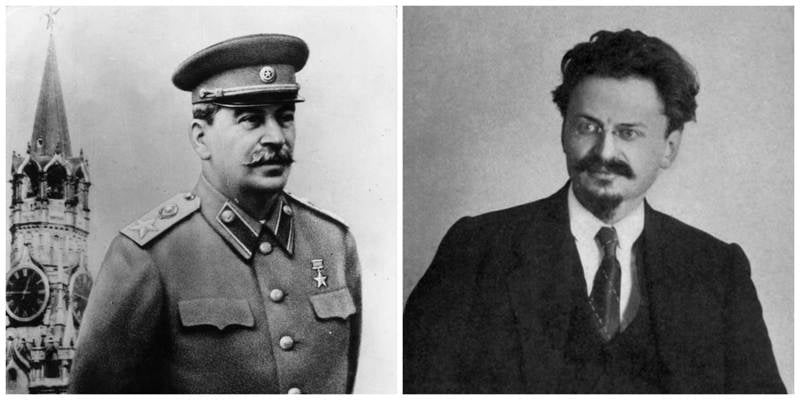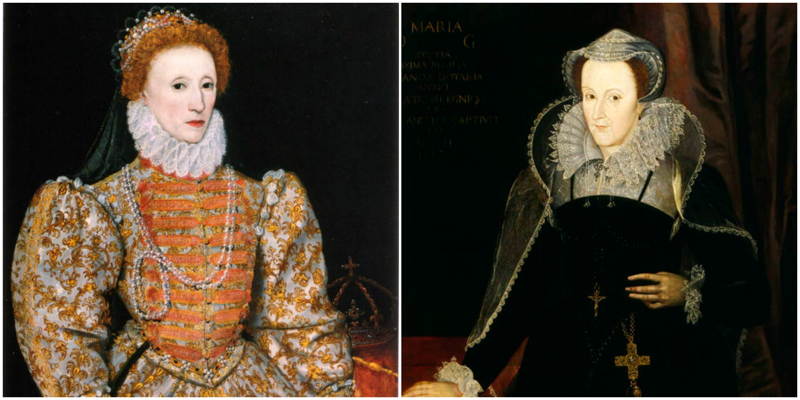
Queen Elizabeth I vs. Mary, Queen of Scots
Most know Queen Elizabeth I for hearkening England’s Golden Age and love or loathe her historical legacy in equal, but there was one particular lady that Queen Elizabeth was not fond of: Mary, Queen of Scots.
The two had a very public dispute over sovereignty that eventually led to Mary’s demise. As the daughter of Henry VIII and Anne Boleyn, Elizabeth had a legitimate, if often contested, claim to the throne.
But following her father’s purposeful move away from the Catholic Church, when she assumed the throne the fate of England’s faith greatly rested in Elizabeth’s hands. In 1558, the protestant queen declared that England was indeed a Protestant country, which inspired the ire of many English Catholics who didn’t think that Elizabeth was the rightful heir to the English crown.
Thus many looked toward Mary, Queen of Scots, to replace Elizabeth. Mary Queen of Scots was the Catholic heir to the Scottish throne, but after a slew of scandals, Mary Stuart was forced to flee the country. She looked to Elizabeth for help and support, but Elizabeth was suspicious that she was going to raise Catholic support and usurp her title, so she kept Mary a virtual prisoner for the next eighteen years in Lochleven Castle.
By 1586, Elizabeth found conclusive proof in the form of letters that Mary was plotting her murder. The feud ended officially on February 8, 1587, when Elizabeth signed a death warrant and Mary Queen of Scots was beheaded at Fotheringhay Castle.
Famous Disputes: Aaron Burr vs. Alexander Hamilton
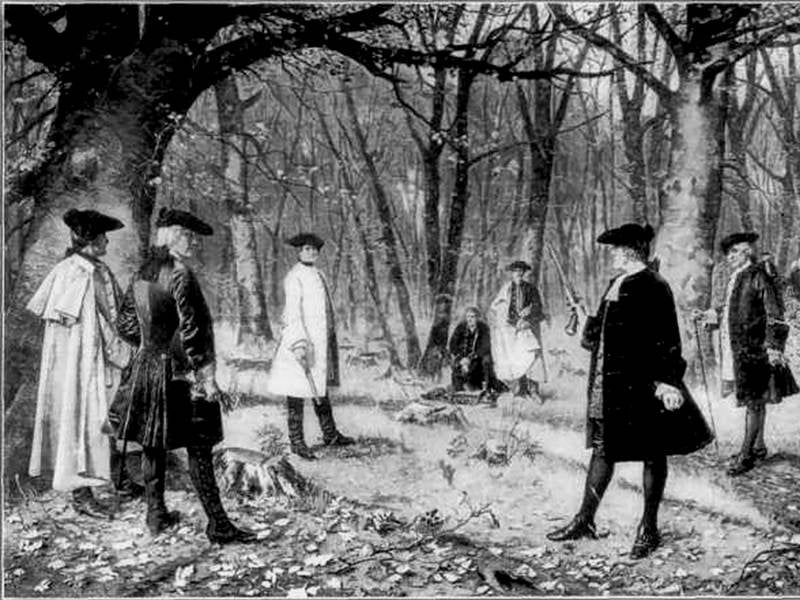
The Burr–Hamilton feud is one of the most prominent spats in American history, and actually involved a physical duel between the two political big wigs. Former Secretary of the Treasury Alexander Hamilton and and sitting Vice President Aaron Burr commenced their long standing dispute in 1791 when Burr won a United States Senate seat from Philip Schuyler, Hamilton’s father-in-law.
Burr snagged the veep spot in Thomas Jefferson’s presidency, and naturally, Hamilton scribbled some inflammatory letters in response. The “personal” letters Hamilton wrote to his friend, James McHenry, vocalized Hamilton’s disdain and animosity toward Burr being selected as VP candidate, including this little nugget:
“Nothing has given me so much chagrin as the Intelligence that the Federal party were thinking seriously of supporting Mr. Burr for president. I should consider the execution of the plan as devoting the country and signing their own death warrant.”
Fortunately for Hamilton, Burr didn’t last very long as vice president, and after being dropped from the 1804 election, decided to run for the governorship of New York instead. Hamilton’s animosity toward him, however, didn’t cease, and he campaigned vigorously against Burr by penning even more incendiary journalistic pieces. Burr eventually lost to Morgan Lewis, a Democratic-Republican endorsed by Hamilton, and what followed was a pistol duel to the death.
On July 11, 1804, at Weehawken in New Jersey, Burr shot and fatally wounded Hamilton. Burr was indicted for murder in both New York and New Jersey, but these charges were later either dismissed or resulted in acquittal. His political career, however, was six feet under.
Famous Disputes: Joseph Stalin vs. Leon Trotsky
After the White Army party’s defeat in 1921, Vladimir Lenin, Joseph Stalin and Leon Trotsky were left as the dominant figures in the new Bolshevik government. Despite the clear rivalry between Stalin and Trotsky (stemming from opposing philosophical and political leadership views), Lenin promoted both and hoped that they would cooperate.
Trotsky’s popularity trumped Stalin’s, so he received a more authoritative position and was thus perceived as Lenin’s heir apparent. Lenin gave Stalin the role of General Secretary of the Communist Party, and though this position was less public, he was strategically able to build loyalty within the Communist Party.
When Lenin’s health began to fail in 1922, tensions over who would be the Communist Party’s successor grew seismic. Though Lenin asked for shared power until his death in 1924, Stalin’s strategic takeover was inevitable. By 1927, Stalin had eliminated all of his political rivals and became the head of the Communist Party of the Soviet Union. Meanwhile, Stalin had Trotsky exiled from the Party and deported him from the Soviet Union by 1929.
Trotsky was eventually assassinated in August 1940 in Mexico by Ramon Mercader, a Soviet agent acting on Stalin’s orders.
Famous Disputes: Lyndon B. Johnson vs. Robert F. Kennedy
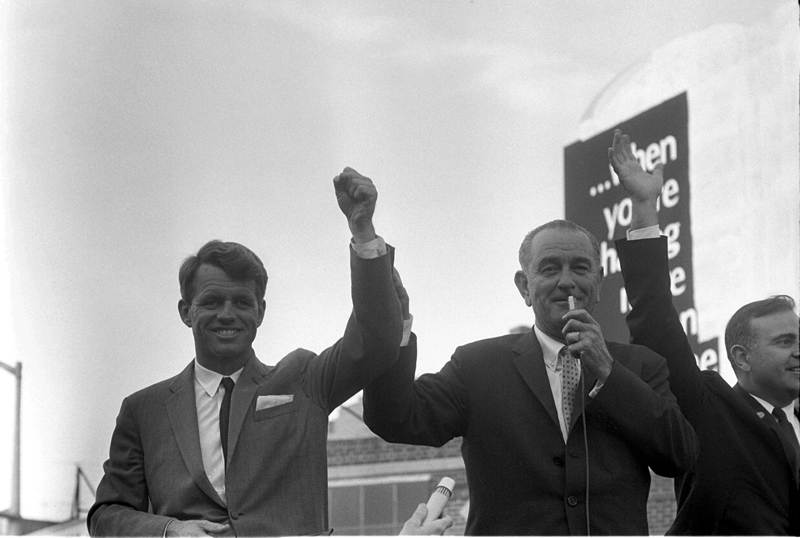
Source: Wikimedia
After John F. Kennedy’s assassination in 1963, a rather open political rivalry sprang up between the two most likely Democratic presidential candidates – his brother and Attorney General, Robert F. Kennedy, and his Vice President, Lyndon B. Johnson. Johnson had a long history of hostility toward the Kennedys, having accused JFK’s father, Joe, of being a communist, dirty politician.
But his feud with Robert Kennedy first garnered attention when they had a chance encounter in the Senate cafeteria. Johnson extended a hand to shake, and Robert Kennedy thoroughly rebuked it. Despite the bad blood between the opposing sides, JFK — in a strategic move that came to the chagrin of his brother — named LBJ his vice president. When JFK was assassinated and the future of the country’s presidential leadership was somewhat uncertain, the conflict reared its ugly head again.
While both men worked alongside each other directly following JFK’s death, the feud continued, and harsh words began to fly. While the two remained relatively reticent in directly accusing one another for problems, their supporters did, and neither Johnson nor Kennedy did anything to quell rumors.
Kennedy supporters vocally and openly blamed Johnson for having urged President Kennedy to take the disastrous trip to Dallas, while Johnson supporters lambasted JFK and RFK for their dire mistakes in Cuba. The following year, Kennedy decided to run for a Senate seat and Johnson, growing paranoid about Kennedy’s political ploys, began to destroy Kennedy’s bills and reintroduced his own.
By the 1968 election, Kennedy did indeed decide to run against president Johnson in the primaries. In a surprising turn of events, Johnson dropped out of the race and Kennedy was declared the frontrunner. Unfortunately, he could not escape the so-called Kennedy curse and was assassinated not soon after.
J. Edgar Hoover vs. Martin Luther King Jr.
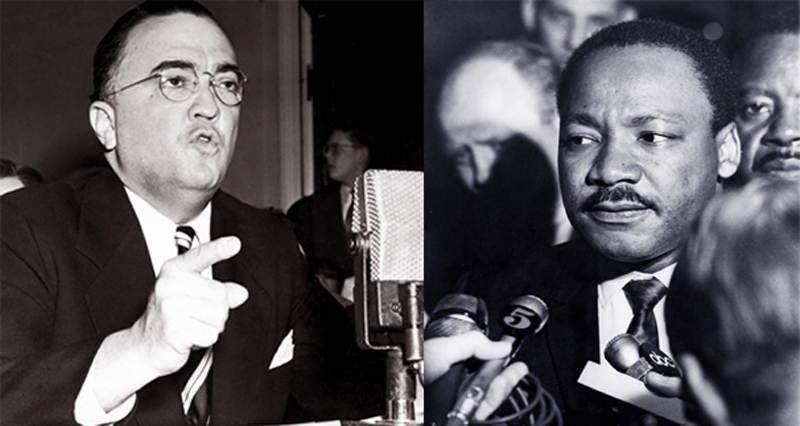
As Martin Luther King became a national icon, one man truly detested him: FBI director and eccentric J. Edgar Hoover. Although the FBI had already been monitoring Martin Luther King Jr. as part of their Racial Matters Program, after his involvement in the Montgomery bus boycott of December 1955 the FBI director held a deep personal animosity towards him.
Hoover believed that the civil rights leader was influenced by Communists, and thus in March 1956 raised concerns that King was associating with card-carrying members of the Communist Party. It wasn’t until 1962—after Hoover disclosed it to then Attorney General, Robert Kennedy—that surveillance properly began. In the months that followed, Robert Kennedy authorized wiretaps on King’s home and offices, and Hoover deployed agents to find subversive material on King.
In 1964, King retaliated by calling the FBI as “completely ineffectual in resolving the continued mayhem and brutality inflicted upon the Negro in the deep South,” which began the verbal sparring. Hoover responded to King’s criticisms in a press conference in November 1964, saying that King was the “most notorious liar in the country.”
Hoover continued covert operations to discredit King’s standing among financial supporters, church leaders, government officials, and the media. The FBI even went as far as to threaten King anonymously, sending him a tape recording of King allegedly in a compromising position in a hotel room along with an anonymous letter that was interpreted as encouraging King to commit suicide.
After King’s assassination in 1968, a US Senate Committee convened in the 1970s to investigate the FBI’s domestic intelligence operations. The committee determined that the impact and efforts to discredit King were unquestionable:
“Rather than trying to discredit the alleged Communists it believed were attempting to influence Dr. King, the Bureau adopted the curious tactic of trying to discredit the supposed target of Communist Party interest—Dr. King himself.”
